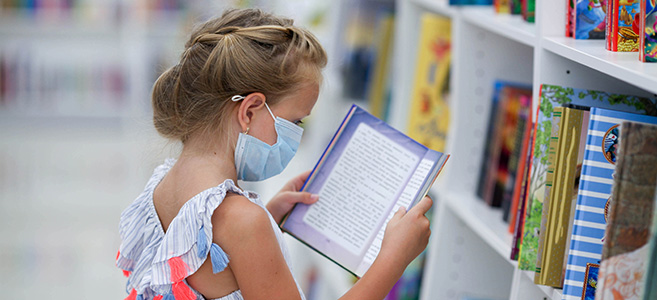7 questions with a pediatrician: What the changes to masking mandates mean for kids
The CDC has announced that people vaccinated against COVID-19 no longer must wear masks indoors. This has led to great relief for some, and a new set of questions for others – namely, parents.
“It’s been an exhausting year for many parents and caregivers, as we’ve been trying to keep everyone – and especially our kids – safe from COVID-19. As more people become vaccinated, infection prevention guidelines are beginning to change. It’s understandable, however, that parents still have questions, particularly when it comes to kids under 12 who aren’t approved to receive the vaccine yet,” said Dr. Tiffany Kimbrough, pediatrician and mom of two kids under 12. “We’ve been answering parents’ questions throughout the pandemic and will continue to provide guidance on the best health and safety measures for kids and families.”
Dr. Kimbrough answered some hot questions related to sickness, school and summer plans in the ever-evolving COVID environment.
1. If children are at low risk for severe disease and adults are eligible for a vaccine, what is the public health value of continuing to wear masks in school?
This is a great question and one that’s on the mind of a lot of parents. The CDC has updated their guidance to continue wearing masks and practicing physical distancing for the rest of the 2020-2021 school year. There are a couple of things to think about – we aren’t yet at herd immunity for adults receiving their vaccination, so it is possible for us to still have community transmission and spread of coronavirus. We also know that children 12+ are eligible to be vaccinated, but that leaves all the younger children still without that ability.
Yes, children are at lower risk for severe disease but not zero risk. An estimated 200,000 children have been hospitalized so far in the pandemic due to COVID, so it’s definitely something we still want to address with caution. Masks continue to be one of the best measures to reduce the spread of coronavirus.
2. What would you say to those who think it's time to make this a matter of choice for parents and localities, rather than a statewide mandate?
Whether it’s a state mandate or not, as a pediatrician and a mom, I recommend that children (and anyone who isn’t vaccinated!) continue wearing masks at this time since they’re not able to be vaccinated and we’re not yet at herd immunity. I know all of us are anxious to get back to normal and we are so close to that point. Part of us being able to move in that direction is for everyone to get the COVID vaccine when they’re eligible and it’s their turn.
3. Now that Virginia’s universal mask requirement has ended, how would you recommend parents think about mask wearing for unvaccinated children in childcare and other environments, particularly in age groups that may not be eligible for several months?
I recommend unvaccinated children continue practicing infection control measures at school, daycare and other public settings. This includes wearing masks for those older than 2 years of age, frequent hand washing and distancing when possible.
4. My child is going to summer camp, should they wear a mask?
If your child has not been fully vaccinated against COVID-19, they should continue to wear a mask when indoors – and outdoors when physical distancing isn’t possible. Dr. Emily Godbout, epidemiologist and infectious diseases specialist offers some additional guidance on summer camp and COVID safety.
5. My child plays sports, do they need a mask?
Again, for those not fully vaccinated, masks covering the nose and mouth should be encouraged as much as possible. This is especially true for indoor sports and those requiring close contact. Be sure your child can breathe adequately through the mask, particularly if they’re participating in a high-intensity sport. Unvaccinated coaches, spectators, volunteers and others attending the sporting event should also wear masks.
6. What should I do if I'm not comfortable with my family discontinuing mask use and I'm getting pressure from others to return to "normal"?
Every family has its own circumstances, beliefs and comfort levels. While adjusting to life amidst COVID was uncomfortable and took some time at first, the same may be true as we make the transition back. Make the decisions that feel right and safest for you and your family, understanding that this won’t look the same for everyone – and that’s okay.
You can also make recommendations to friends and families to gather in smaller groups or outdoors until everyone is vaccinated – stick to what makes you comfortable! Following the prevention measures you know to be effective, like masking and/or vaccination for eligible adults and teens, can help prevent undue stress or worry about the health of those you love.
7. There’s so much COVID-19 information on social media and the news! Who should I talk to if I have questions about masking or vaccines?
It’s true that there’s a lot of information circulating and, unfortunately, not all of it is accurate. Your child’s pediatrician or primary care provider is the best source for specific answers. They know your child’s medical history and can answer your questions based on this information and the latest COVID data in your community. They can also share reputable resources related to your child’s age, health conditions, vaccination status and other personal circumstances.

